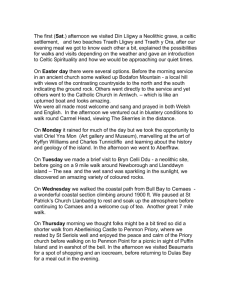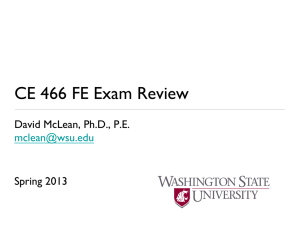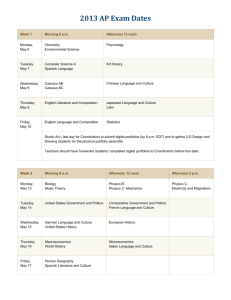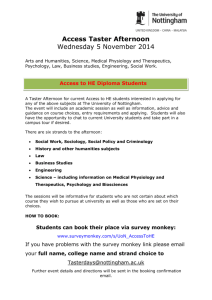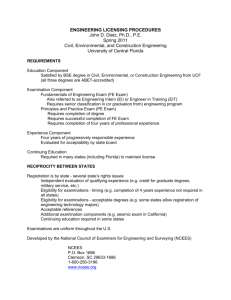FE Exam for Computer & Electrical Engineers
advertisement
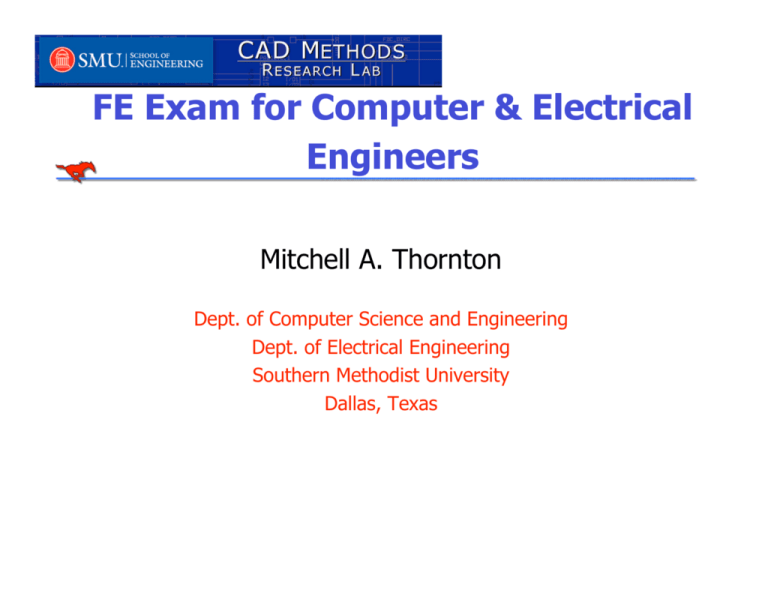
FE Exam for Computer & Electrical Engineers Mitchell A. Thornton Dept. of Computer Science and Engineering Dept. of Electrical Engineering Southern Methodist University Dallas, Texas Why Pursue FE? • Acceptance from other engineering disciplines • Entrepreneurship: Starting your own business as an engineer - Private Practice • Finding a job • Quality assurance Why don’t students take it? • Don’t believe they can pass it • Don’t see the importance of it • Don’t think it will help them Student Fears • Only Taken a fraction of the courses • No Computer Engineering afternoon exam – Other Disciplines Afternoon Exam (NOT RECOMMENDED) – Electrical Engineering Afternoon Exam • Should be seen as challenge not obstacle Handling Student Fears: Early Academic Experience • Take their elective courses seriously • Focus not only on the grade but on the knowledge gained • Not an easy task – Early Academic Experience is time when “Other” Matters are More Concerning Handling Student Fears: Middle Academic Experience • Don’t just take the easiest elective • Use science elective for Chemistry II or other course covered by the FE • Use free elective for an additional math course or a course in a different field of engineering Handling Student Fears: Late Academic Experience • Reassurance that it is never too late • Encouragement to sign up for an FE review course FE Examination Content • 8 Hour Exam - Closed Notes – 4 Hour Morning Session on General Topics – 4 Hour Afternoon Session in Choice of: General, Chemical, Civil, Electrical, Environmental, Industrial, or Mechanical • 180 Multiple-choice Questions • 70% to Pass (Based on Equivalent Cut Score) • Reference Material Supplied FE Examination Security • Use Calculators from Supplied List Only • No Notes or Books Allowed • Reference Manual and Reference Equation List Provided • Mechanical Pencils Provided • All Jurisdictions use NCEES Exam, but Individual State Boards may Have Additional Restrictions Morning Session Specification TOPIC PERCENTAGE QUESTIONS Mathematics 15% 18 Probability/Statistics 7% 8-9 Chemistry 9% 10-11 Computers 7% 8-9 Ethics/Business Practice 7% 8-9 Engineering Economics 8% 9-10 Statics and Dynamics 10% 12 Strength of Materials 7% 8-9 Material Properties 7% 8-9 Fluid Mechanics 7% 8-9 Electricity/Magnetism 9% 10-11 Thermodynamics 7% 8-9 120 Questions in Total - Average of 2 Minutes/Question 44-47 Questions 19-21 Questions 44-48 Questions Afternoon Session Specification Most Computer Engineering Students Choose Either the Electrical or General Afternoon Question Set TOPIC PERCENTAGE QUESTIONS Circuits 16% 10 Power 13% 8 Electromagnetics 7% 4 Control Systems 10% 6 Communications 9% 5 Signal Processing 8% 5 Electronics 15% 9 Digital Systems 12% 7 Computer Systems 10% 6 Electrical Afternoon Session Afternoon Session Specification Most Computer Engineering Students Choose Either the Electrical or Other Disciplines Afternoon Question Set TOPIC PERCENTAGE QUESTIONS Advanced Engineering Mathematics 10% 6 Engineering Probability/Statistics 9% 5 Biology 5% 3 Control Systems 10% 6 Engineering Economics 13% 8 Engineering Mechanics 11% 7 Engineering Materials 15% 9 Fluids 12% 7 Thermodynamics/Heat Transfer 15% 9 Other Disciplines Afternoon Session 8 Step Plan to Pass the FE • Step 1 – Sign up for review course – Buy a FE study guide • Step 2 – Take a sample exam • Step 3 – Strengths – Weaknesses 8 Step Plan to Pass the FE • Step 4 – Spend little time on area of strengths • Step 5 – Spend most of your time on areas that are • Rusty • Feel that you can master in the allotted time 8 Step Plan to Pass the FE • Step 6 – Take a second practice exam a week before FE – Identify areas that need a little more work • Step 7 – Work only on areas identified in Step 6 • Step 8 – Stop studying an hour before going to sleep the night before to relax – Get a full 8 hours of sleep Students should Take the FE • It is important - Professionalism • Real life examples of the need of PE • Gives students a valuable Credential • Not Intended to test your degree of mastery of all subject areas but as test of minimal competence to ensure public safety Review NCEES Website • http://ncees.org • Go to Exams Section – Test Specifications – Familiarize yourself with Reference Guide – Obtain & Use Approved Calculator • Check Website Periodically Conclusion • Importance of being licensed PE: – public health, welfare & safety • Engineers are Professionals – let’s behave like professionals • Licensing is a PRIVELEGE from a Governing Body – not a RIGHT • Holding a Degree in Engineering Means you Studied the Field – Holding a License Means you ARE an Engineer

